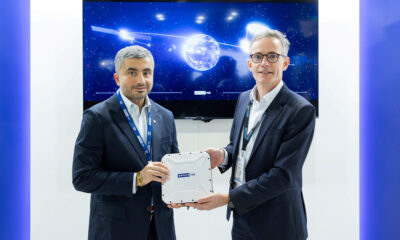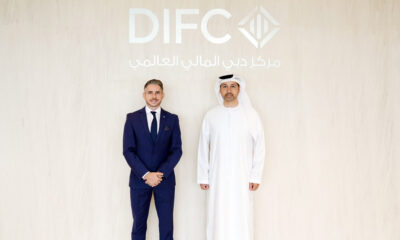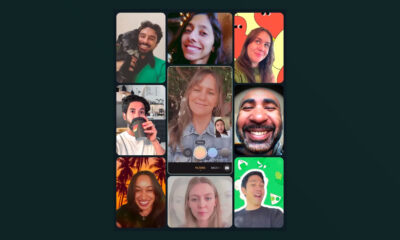News
WhatsApp Channels Has Started Rolling Out Across The MENA Region
The one-way broadcast tool allows account admins to send text, photos, videos, and stickers to followers, and create polls.

WhatsApp Channels is now being rolled out across the MENA region, with countries including Lebanon, Saudi Arabia, the UAE, Egypt, and Morocco soon to benefit from the broadcast service.
Soon, people across much of the Middle East and North Africa will benefit from private updates from their favorite celebrities, creators, artists, and sports teams without having to leave WhatsApp.
Moon Baz, Creator Partnerships Lead, Africa, Middle East, and Turkey at Meta, was excited to announce the update, “We’re starting to roll out WhatsApp Channels globally and adding thousands of new channels that people can follow in WhatsApp. We’re also welcoming some of your favorite celebrities, sports teams, artists, creators, and thought leaders that people can follow right within WhatsApp”.

According to Moon Baz, Channels allow admins to send one-way broadcasts via text, photos, videos, and stickers. Users can find Channels in a new WhatsApp tab labeled Updates, which is separate from their regular chats with friends, family, and communities.
WhatsApp users will be able to see recommended Channels based on popularity and region. Similar to regular chats, they will also be able to use emojis to react to updates — though users won’t be able to see someone else’s reaction.
Also Read: Dubai Airport To Introduce Complete Biometric Admin System
Channel updates will not be available indefinitely. Meta will store data on their servers for up to 30 days. Admins will also be able to block screenshots and forwards from their channels.
Overall, WhatsApp Channels look set to become an effective tool for getting in touch with your target audience — whether you’re an influencer or a business looking for marketing opportunities.
News
Alienware Just Announced Six New Gaming Monitors
The new models include three QD-OLED and three budget-friendly QHD options, expanding the company’s lineup for all gamers.

Alienware has just updated its gaming monitor lineup with six new additions, including the highly anticipated Alienware 27 4K QD-OLED Monitor. The latest wave of releases is set to reach more gamers than ever, offering high-end QD-OLED displays alongside more budget-friendly options.
The latest displays clearly show that the company is doubling down on QD-OLED with three new models sporting the technology. A redesigned Alienware 34 Ultra-Wide QD-OLED Monitor is also making a return, further refining what is already a fan-favorite display.
A Unified Design: The AW30 Aesthetic
All six monitors feature Alienware’s new AW30 design language, first introduced at CES. The AW30 aesthetic brings a futuristic, minimalist look that unites the entire lineup under a cohesive visual identity.
Pushing QD-OLED Even Further
The refreshed Alienware 34 Ultra-Wide QD-OLED Monitor (AW3425DW) builds on its predecessor’s success with a 240Hz refresh rate (up from 175Hz) and HDMI 2.1 FRL support. It also gains G-SYNC Compatible certification alongside AMD FreeSync Premium Pro and VESA AdaptiveSync, ensuring ultra-smooth performance. With a WQHD (3440×1440) resolution and an 1800R curve, this display enhances immersion for both gaming and cinematic experiences.
For those who crave speed, the Alienware 27 280Hz QD-OLED Monitor (AW2725D) pairs a high refresh rate with QHD resolution, balancing sharp visuals with ultra-smooth gameplay. Meanwhile, the Alienware 27 4K QD-OLED Monitor (AW2725Q) delivers stunning clarity with an industry-leading pixel density of 166 PPI, making it the sharpest OLED or QD-OLED monitor available.
Also Read: Infinite Reality Acquires Napster In $207 Million Deal
Worried about OLED burn-in? Alienware’s entire QD-OLED lineup comes with a three-year limited warranty covering burn-in concerns, offering peace of mind for gamers investing in these high-end displays.
Bringing QHD To A Wider Audience
Alongside QD-OLED, Alienware is also releasing three new QHD gaming monitors aimed at more price-conscious gamers. The Alienware 34 Gaming Monitor (AW3425DWM), Alienware 32 Gaming Monitor (AW3225DM), and Alienware 27 Gaming Monitor (AW2725DM) provide a range of sizes and formats to suit different preferences:
- The Alienware 34 Gaming Monitor (AW3425DWM): An ultrawide (WQHD) option for a panoramic, immersive experience.
- The Alienware 32 Gaming Monitor (AW3225DM): A standard 16:9 panel for a traditional but expansive desktop setup.
- The Alienware 27 Gaming Monitor (AW2725DM): A 27” display offering the same performance in a more compact form factor.
All three gaming monitors feature a fast 180 Hz refresh rate, a 1ms gray-to-gray response time, and support for NVIDIA G-SYNC, AMD FreeSync, and VESA AdaptiveSync to eliminate screen tearing. Additionally, with 95% DCI-P3 color coverage and VESA DisplayHDR400 certification, these displays deliver vibrant colors and high dynamic range for lifelike visuals.
-

 News3 weeks ago
News3 weeks agoSpace42 & Cobham Satcom Launch New Satellite Broadband Terminal
-

 News3 weeks ago
News3 weeks agoRipple Gains DFSA License To Offer Crypto Payments In Dubai
-

 News2 weeks ago
News2 weeks agoAre You Ready For Hong Kong’s InnoEX & Electronics Fair?
-

 News2 weeks ago
News2 weeks agoWizz Air Abu Dhabi Adds Beirut Flights Amid Tourism Revival



















